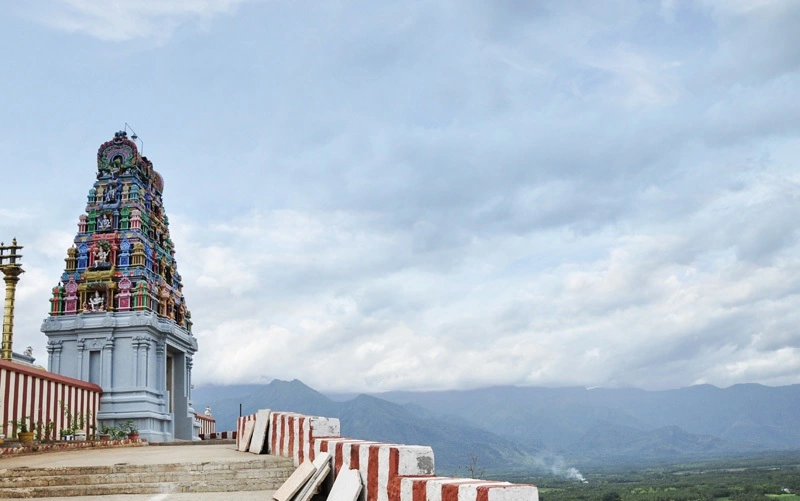




Theni is home to several temples that are both spiritually significant and architecturally impressive. Here are five famous temples in Theni:
Location: Veerapandi, Theni
Famous for: This ancient temple is dedicated to Goddess Gowmariamman and Lord Shiva. It is believed to have been built during the Pandya dynasty and attracts a large number of devotees, especially during the Chithirai festival.
The temple is believed to have been built by the Pandya kings, making it an ancient site with deep historical roots. It has a legacy that connects to the Tamil civilization's rich religious and cultural history.
The temple is dedicated to Goddess Gowmariamman and Lord Shiva. The presiding deity, Goddess Gowmariamman, is worshipped for her protective and healing powers.
The temple is famous for its grand Chithirai festival, which takes place during the Tamil month of Chithirai (April-May). Thousands of devotees gather during this time for special prayers, rituals, and processions.
Many devotees believe that the waters of the temple tank have healing properties, especially for skin diseases. Pilgrims often take a dip in the holy water as part of their visit.
The temple showcases traditional South Indian architecture, with intricately carved pillars, vibrant sculptures, and a beautifully maintained temple complex, reflecting the architectural brilliance of the Pandya era.
This temple is a major spiritual and cultural landmark in the Theni region, attracting visitors from across Tamil Nadu.
Location: Kuchanur, near Theni
Famous for: Dedicated to Lord Shani (Saturn), this temple is one of the few shrines in India where Lord Shani is the presiding deity. It is a major destination for those seeking relief from astrological influences of Saturn.
The temple is one of the rare shrines in India where Lord Shani (Sanneeswarar) is the presiding deity. Lord Shani is revered as the god of Saturn and is believed to influence one's karma and planetary position in astrology.
The temple is particularly popular among devotees seeking relief from the adverse effects of Saturn (Sani Dosha) in their astrological charts. Pilgrims visit to perform special prayers and rituals to appease Lord Shani and seek blessings for prosperity and relief from difficulties.
The idol of Lord Shani in this temple is said to be self-manifested (Swayambu), a natural formation rather than sculpted. This adds to the spiritual significance and attracts devotees from across India.
The temple is situated along the Surabi river, creating a peaceful and serene atmosphere for worship. The river's proximity is believed to enhance the temple's spiritual energy.
Unlike most temples where Lord Shani is accompanied by Navagrahas (nine planetary deities), this temple uniquely focuses on Shani alone. Devotees offer sesame oil, black sesame seeds, and other items associated with Saturn for poojas (rituals) to seek divine grace.
The Kuchanur Sanneeswarar Temple is a significant pilgrimage destination for people experiencing difficulties linked to Saturn and those looking for spiritual peace.
Location: Theni
Famous for: Another temple dedicated to Lord Saneeswarar, this one is located within Theni itself and is a popular local pilgrimage site.
The temple is primarily dedicated to Lord Saneeswarar (Shani), the god of Saturn, known for his influence over karma and fate in Hindu astrology. People come here to mitigate the malefic effects of Saturn in their lives.
Alongside Lord Saneeswarar, the temple is also dedicated to Goddess Ulagamman, adding to its spiritual significance. Ulagamman is considered a form of the Divine Mother, offering protection and blessings to devotees.
Many devotees visit this temple to perform special rituals and prayers to alleviate Sani Dosha (the adverse effects of Saturn) in their astrological charts. It is believed that sincere worship here can bring relief from hardships caused by Saturn's influence.
Saturday is considered the most auspicious day for worshiping Lord Saneeswarar, and the temple sees a significant influx of devotees, especially on Saturdays. Special poojas and offerings are performed on this day.
Devotees offer items such as black sesame seeds, sesame oil, and black cloth to Lord Saneeswarar as part of the rituals. These offerings are believed to appease Saturn and reduce his unfavorable effects.
The Theni Saneeswarar Temple is a key spiritual destination for those seeking divine intervention to overcome difficulties linked to planetary influences, particularly Saturn.
Location: Devadanapatti, Theni
Famous for: This temple, dedicated to Goddess Kamatchi Amman, has a unique ritual where the sanctum is never opened. The worship is done from outside the closed doors. The temple is located at the foothills of Kodaikanal.
The temple is dedicated to Goddess Kamatchi Amman, a form of Parvati, the divine mother. She is worshipped as a powerful goddess who bestows protection, prosperity, and fertility.
One of the most distinctive features of this temple is that the sanctum sanctorum (garbhagriha) remains permanently closed, and devotees offer prayers from outside the closed doors. No one, including priests, is allowed to enter the sanctum.
According to local legends, the temple was built at the site where the goddess appeared to bless the locals. This belief has made the temple a revered site for devotees seeking
divine blessings for health, happiness, and family welfare.
Worship in this temple is performed in a minimalistic manner. Offerings like flowers, coconuts, and camphor are presented outside the sanctum. Despite the simplicity of the rituals, devotees believe that the power of Goddess Kamatchi Amman is profound.
The temple is situated at the foothills of the Western Ghats, near Kodaikanal, adding to the serene and picturesque environment. The scenic location enhances the spiritual atmosphere of the temple.
The Kamatchi Amman Temple is widely respected for its unique practices and is a place of deep spiritual reverence for those seeking the goddess's protection and blessings.
Location: Periyakulam, near Theni
Famous for: This temple is dedicated to Lord Murugan and is well-known for its grand architecture. The temple attracts devotees during festivals like Thaipusam and Panguni Uthiram.
The temple is dedicated to Lord Balasubramanya, a youthful form of Lord Murugan (the god of war and victory). Lord Murugan is highly revered in Tamil Nadu, and this temple attracts devotees seeking his divine blessings for strength, wisdom, and success.
The temple is known for its beautiful Dravidian architecture, featuring intricately carved pillars, gopurams (towers), and vibrant sculptures that showcase the rich artistic heritage of Tamil Nadu.
The Thaipusam festival is celebrated with great grandeur here, attracting thousands of devotees. It marks the day Lord Murugan received the Vel (divine spear) from his mother, Parvati, to defeat evil forces. Another important festival is Panguni Uthiram, celebrating the marriage of Murugan and Deivanai.
Devotees believe that worshiping Lord Balasubramanya at this temple brings protection, courage, and the removal of obstacles. Special rituals and poojas are performed for devotees facing challenges in life, particularly those related to family and career.
The temple is located in Periyakulam, a town known for its scenic beauty and proximity to the Western Ghats. The surrounding hills and greenery provide a peaceful and spiritually uplifting atmosphere for worship.
The Balasubramanya Temple is not only a place of religious importance but also a key part of the cultural fabric of the Theni region, drawing devotees year-round for spiritual guidance and celebration.
These temples are not only religious hubs but also represent the region’s rich cultural heritage.